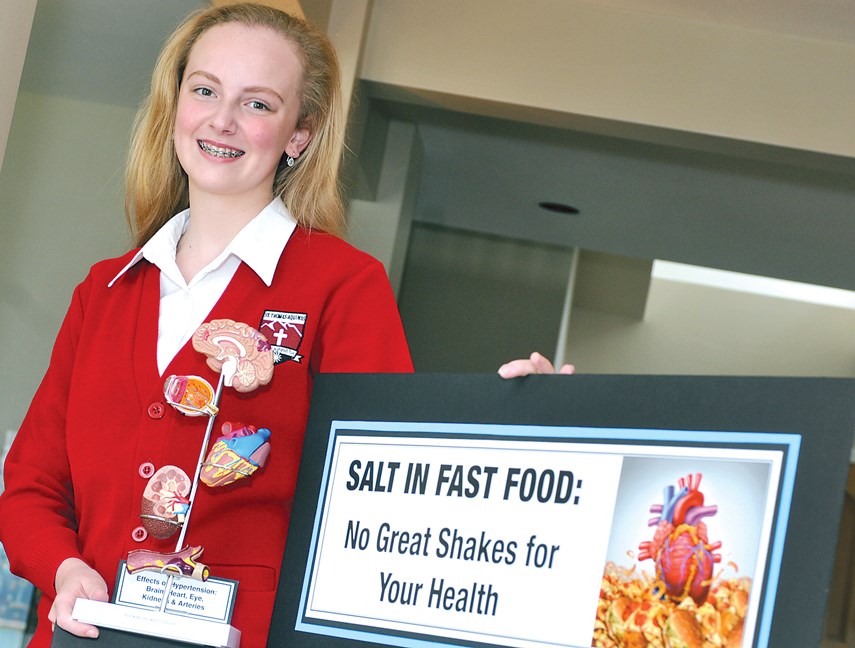A fast life fueled by fast food led St. Thomas Aquinas Grade 8 student Laura Cunningham to design a science fair project that earned her a place in the Canada-Wide Science Fair amongst the countries top young hypothesizers.
Cunningham’s study on the effect of sodium on blood pressure grew out of her own penchant for grabbing quick bites as she shuttled from school to piano and saxophone classes, over to horse riding lessons and back again.
“We’re always doing things and on the go,” Cunningham said about her fast-paced family. “I eat kind of a lot of fast food because I’m always in a rush, I’m going places and it’s convenient.”
She started to wonder, however, what all that fast food was doing to her body, leading to a project that earned her gold in the junior health category as well as the Grand Award at the Greater Vancouver Regional Science Fair held in April.
In her study Cunningham measured subjects’ blood pressure 30 minutes after first having water as a control substance and then after consuming a bouillon-based beverage containing the amount of sodium found in an average fast food meal. When the results came in, Cunningham wasn’t surprised to learn that sodium raised blood pressure but she was taken aback by how much it went up after just one serving of the bouillon juice.
“I found that after the participants consumed the sodium, the blood pressure statistically significantly increased,” she said. “I was kind of surprised that it was statistically significant. I expected it to be a bit of a change, but it was quite a drastic change.”
The allure of sodium was made all the more evident by the reaction of many of her subjects to the salt juice.
“Most of them actually enjoyed it,” she said with a laugh. “I had a participant who said he would eat that for lunch every day.”
That’s one of the problems with fast food, Cunningham surmised. Sure it’s cheap and quick, but for many people it’s also quite tasty because it’s loaded with sodium. Even supposed healthier options like sushi can come with secret salt bombs – adding too much soy sauce can turn your California roll into the equivalent of a burger and fries combo meal very quickly.
“Sodium in soy sauce is a lot more than even fast food,” said Cunningham.
Her findings have led Cunningham to at least consider some alterations to her food choices as she continues her fast-paced life.
“I definitely think more about what I’m eating and try to look for reduced sodium things,” she said. “But it’s difficult because it’s not just in fast food, it’s in all those cans and processed food. So now I look at the nutrition chart more. … I think that everyone should just be aware of what they’re eating. It’s important for the public to know what they’re consuming and how it affects them.”
Cunningham got to share her message with an even wider audience at the Canada-Wide Science Fair, which wraps up this weekend in Regina. More than 500,000 Canadian students do science fair projects each year with only about 500 making it to the national competition. No matter what happens in Regina, Cunningham – who says she wants to be a doctor like her father – has likely earned a meal out for her work. No doubt it will be served nice and slow, with lots of vegetables.
UPDATE: Cunningham claimed a bronze medal for her project at the Canada-Wide Science Fair.



